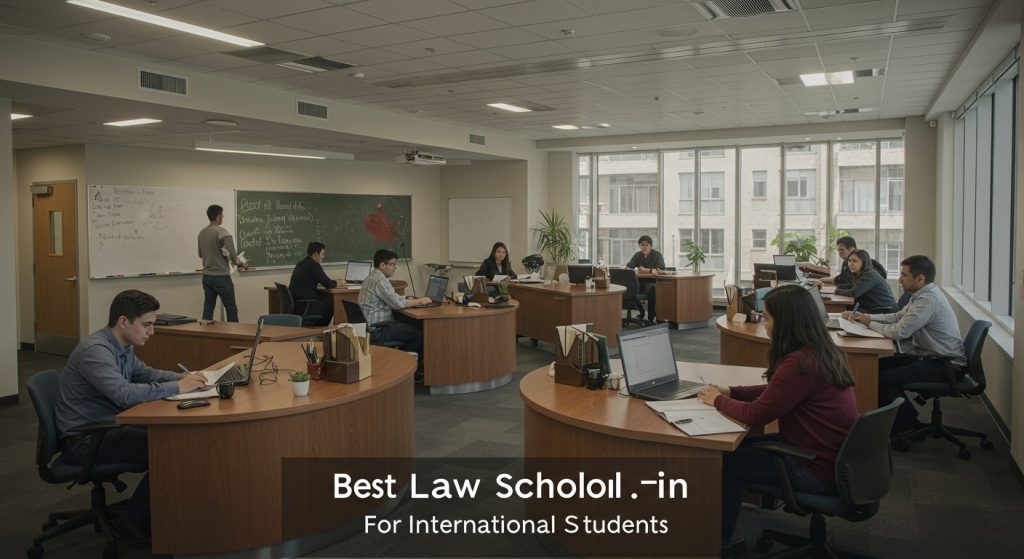Canada’s legal landscape is increasingly global, demanding lawyers with cross-cultural understanding and expertise. International students seeking a world-class legal education find a welcoming environment and diverse specializations within Canadian law schools. Choosing the right institution requires careful consideration of factors beyond rankings, including program focus, experiential learning opportunities. Post-graduation support for international graduates.
This exploration begins with an overview of Canada’s top law schools, focusing on programs particularly attractive to international applicants. We’ll then delve into key benefits, such as specialized clinics, internationally-focused courses. Career services tailored to global legal careers. Ultimately, the goal is to highlight learning outcomes and provide a framework for understanding how each school prepares international students for success in an interconnected legal world.
Program Overview and Benefits
Pursuing a law degree in Canada as an international student opens doors to a globally recognized legal education. Canadian law schools emphasize critical thinking, analytical skills. Practical application of legal principles. This prepares graduates for diverse career paths, both within Canada and internationally. The benefits extend beyond academics. Studying in Canada provides exposure to a multicultural environment, enhancing cross-cultural communication skills. This is invaluable in today’s increasingly globalized legal landscape. Canadian law schools also offer opportunities for networking with legal professionals and participating in moot court competitions, further enriching the learning experience. Moreover, a Canadian law degree can be a pathway to permanent residency. Canada’s immigration policies often favor skilled workers, including lawyers. This makes Canada an attractive destination for international students seeking long-term career prospects and a high quality of life.
Key Features and Requirements
Canadian law programs, often referred to as Juris Doctor (JD) programs, typically require a bachelor’s degree for admission. Unlike the US, a specific pre-law major isn’t mandatory; a strong academic record across any discipline is valued. But, courses emphasizing critical thinking, writing. Research are highly recommended. The Law School Admission Test (LSAT) is a crucial component of the application process. A strong LSAT score significantly enhances your chances of admission to competitive programs. Prepare thoroughly for the LSAT, utilizing practice tests and preparation courses. Beyond academic qualifications and the LSAT, law schools also consider extracurricular activities, volunteer work. Personal essays. These elements provide a holistic view of the applicant, showcasing their character, leadership potential. Commitment to law. Crafting a compelling personal statement is essential for conveying your passion and suitability for legal studies.
Career Prospects and Outcomes
A Canadian law degree equips graduates with a wide range of career options. The traditional path leads to practicing law as a barrister or solicitor, representing clients in court or providing legal advice. But, legal training is also highly valued in other sectors. Graduates can pursue careers in government, policy-making, business. Academia. Legal expertise is essential for navigating complex regulations and ensuring ethical conduct in these fields. The analytical and problem-solving skills developed in law school are transferable to diverse roles. Moreover, a Canadian law degree can facilitate international career opportunities. The common law system prevalent in Canada is also used in many other countries. This makes Canadian-trained lawyers attractive to employers worldwide, particularly in Commonwealth nations.
Application Process and Tips
The application process for Canadian law schools involves submitting transcripts, LSAT scores, personal essays. Letters of recommendation. Each school has its own specific requirements and deadlines, so thorough research is crucial. Start preparing your application well in advance to ensure you meet all the criteria. Crafting a strong personal essay is essential. This is your opportunity to showcase your unique experiences, motivations. Goals. Highlight your skills and qualities that make you a suitable candidate for law school. Seek feedback from professors, mentors, or career advisors to refine your essay. Securing strong letters of recommendation is also vital. Choose referees who know you well and can speak to your academic abilities, work ethic. Character. Provide them with ample time to write thoughtful and personalized letters that support your application.
Comparing Top Law Programs: USA vs. Canada
When considering law school, many international students weigh options in both the USA and Canada. Both offer excellent legal education. Key differences exist. US law schools often have a more competitive and hierarchical environment. Canadian law schools tend to be more collaborative and less focused on rankings. Tuition fees in US law schools are generally higher than in Canadian institutions. This makes Canada a more affordable option for many international students. Living expenses may also be lower in some Canadian cities compared to major US metropolitan areas. But, comparing law programs between USA and Canada requires looking beyond costs. Moreover, the legal systems differ. The US legal system is more adversarial, while the Canadian system emphasizes negotiation and compromise. The choice depends on your preferred learning style and career aspirations. Researching the specific strengths and specializations of each school is crucial for making an informed decision.
Key Considerations for International Students
Choosing a law school is a significant decision, especially for international students. Factors beyond academic reputation should be considered. It’s vital to research the school’s support services for international students. This includes assistance with visas, accommodation. Cultural adjustment. Networking opportunities are crucial for career development. Look for schools with strong alumni networks and connections to legal professionals in your desired field. Attending law school fairs and data sessions can provide valuable insights and networking opportunities. Finally, consider the location of the law school. The legal job market varies across different provinces and cities in Canada. Choosing a school in a region with strong demand for lawyers in your area of interest can increase your chances of securing employment after graduation.
Evaluating Law School Rankings and Reputation
Law school rankings can be a useful tool for evaluating academic reputation. But, they should not be the sole factor in your decision. Different ranking systems use different methodologies. Rankings can fluctuate from year to year. Focus on the factors that are most crucial to you, such as faculty expertise, program specialization. Career placement rates. Reputation is also crucial. It’s subjective. Talk to current students and alumni to get a sense of the school’s culture and environment. Visit the campus if possible to experience it firsthand. Consider the school’s reputation within the specific legal community you aspire to join. Ultimately, the best law school for you is the one that aligns with your individual goals, values. Learning style. Don’t be swayed solely by rankings or prestige. Choose a school where you feel you can thrive academically, professionally. Personally.
Essential Resources for International Applicants
Navigating the law school application process can be daunting, especially for international students. Fortunately, numerous resources are available to provide guidance and support. The Law School Admission Council (LSAC) website is a valuable resource for data on the LSAT, application procedures. Law school profiles. Consult with education advisors or counselors who specialize in international student admissions. They can provide personalized guidance based on your academic background and career aspirations. Attend webinars and data sessions offered by law schools to learn more about their programs and admission requirements. Utilize online forums and communities where international students share their experiences and advice. Connect with current students or alumni from your home country who have attended Canadian law schools. Their insights can be invaluable in making informed decisions and preparing for the challenges of studying abroad.
Financial Aid and Scholarship Opportunities
Financing legal education can be a significant challenge, especially for international students. Explore various financial aid and scholarship opportunities to help offset the costs. Research scholarships specifically designed for international students pursuing law degrees in Canada. Some scholarships are offered by the law schools themselves, while others are provided by external organizations. Consider applying for student loans from your home country or international lending institutions. Investigate government-sponsored loan programs that may be available to international students. Develop a realistic budget and explore options for part-time employment during your studies to supplement your income. Start researching and applying for financial aid and scholarships well in advance of the application deadlines. The competition for funding can be fierce, so a proactive approach is essential. A well-crafted scholarship application that highlights your academic achievements, leadership potential. Financial need can significantly increase your chances of success.
Building a Strong Application Profile
Building a strong application profile requires a holistic approach that goes beyond academic achievements. Showcase your extracurricular activities, volunteer work. Leadership experiences. These elements demonstrate your character, commitment. Ability to contribute to the law school community. Highlight any relevant work experience, particularly internships or jobs in legal or related fields. This demonstrates your interest in law and provides valuable insights into the legal profession. Develop strong writing and communication skills, as these are essential for success in law school and beyond. Seek opportunities to participate in moot court competitions or debate clubs. These activities enhance your analytical and advocacy skills, which are highly valued by law schools. Building a well-rounded application profile that showcases your academic abilities, extracurricular involvement. Personal qualities will significantly increase your chances of admission.
Top Law Schools in Canada for International Students
Choosing the right law school is a crucial step towards a successful legal career. While rankings provide a general overview, it’s essential to consider factors like program specialization, faculty expertise. Career placement rates. Here’s a brief overview of some top Canadian law schools that are particularly welcoming to international students:
- University of Toronto Faculty of Law: Known for its rigorous academic program and strong focus on international law.
- McGill University Faculty of Law: Offers a unique bilingual and bijural program, providing a comprehensive understanding of both common and civil law.
- University of British Columbia Allard School of Law: Renowned for its expertise in environmental law and indigenous legal issues.
- Osgoode Hall Law School (York University): Offers a diverse range of specializations and a strong emphasis on experiential learning.
- University of Alberta Faculty of Law: Known for its supportive community and focus on practical legal skills.
Conclusion
Choosing the right law school in Canada as an international student is a pivotal decision, one that demands careful consideration of your career aspirations and personal circumstances. Remember, beyond rankings and reputation, factors like specialized programs in areas like international law or human rights law, the availability of clinics focusing on immigration law. The strength of alumni networks in your desired field are crucial. I’ve seen firsthand how students who actively engage with faculty, attend networking events. Seek out internships tailored to their interests significantly enhance their career prospects post-graduation. Looking ahead, the Canadian legal landscape is increasingly focused on areas like technology law and environmental law, so consider programs that offer expertise in these emerging fields. Your next steps should involve connecting with current students and alumni, attending virtual details sessions. Meticulously reviewing the curriculum of each program to ensure it aligns with your goals. Ultimately, success in law school and beyond hinges on your proactive engagement, adaptability. Unwavering commitment to your legal journey. Embrace the challenge. A rewarding career awaits you.
FAQs
So, what actually makes a law school ‘best’ for international students in Canada? It’s not just rankings, right?
Exactly! While rankings like Maclean’s are a starting point, ‘best’ is super subjective. For international students, think about factors like: does the school have a strong international student support system? Are there specific programs or clinics focusing on international or immigration law? What’s the cost of living in the city where the school is located? And how well does the school prepare you for licensing or further studies back in your home country, if that’s your plan?
Okay, so give me some names. Which Canadian law schools are generally well-regarded for international students?
You’ll often hear McGill, the University of Toronto. UBC mentioned. Osgoode Hall Law School at York University is also a strong contender. These schools typically have robust international programs and a good reputation. But don’t discount others! Schools like the University of Alberta and the University of Ottawa can also be fantastic, especially depending on your specific interests.
What kind of financial aid or scholarships can international students realistically expect at Canadian law schools?
Honestly, funding for international students is competitive. Canadian law schools aren’t known for handing out tons of full-ride scholarships. Look closely at each school’s website for specific international student scholarships and bursaries. Also, explore external funding options – there might be scholarships available from organizations in your home country or international foundations.
The LSAT! Do I really need to take it for Canadian law schools?
Generally, yes. Most common law programs in Canada require the LSAT. But, there might be a few exceptions, particularly for students with strong academic backgrounds from certain countries. Always check the specific requirements for each law school you’re interested in. It’s better to be safe than sorry and prepare for the LSAT.
Beyond academics, what should I consider when choosing a law school in Canada?
Think about the city! Do you prefer a bustling metropolis like Toronto or a more laid-back environment like Vancouver? The cost of living varies greatly. Your overall experience will be heavily influenced by your surroundings. Also, consider the school’s culture and the opportunities it provides for networking and extracurricular activities. Are there moot court competitions you’re interested in? Is there a strong international law student association?
What’s the deal with licensing after graduation? How does that work for international grads?
This is a huge question! Licensing varies by province. After graduating, you’ll likely need to complete articling (a supervised work experience) and pass the bar exam in the province where you want to practice. International grads might face additional requirements, like having their credentials assessed. Research the licensing process in your target province early in the application process!
Is it worth reaching out to current international students at the schools I’m considering?
Absolutely, 100%! This is one of the best things you can do. Most law schools have international student associations or alumni networks. Connecting with current students can give you invaluable insights into the school’s culture, the support they provide. The overall experience of being an international student there. They can answer questions the official brochures might not cover.



